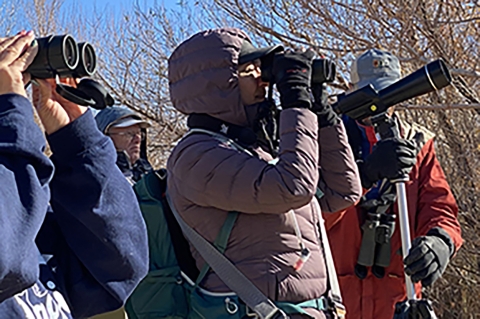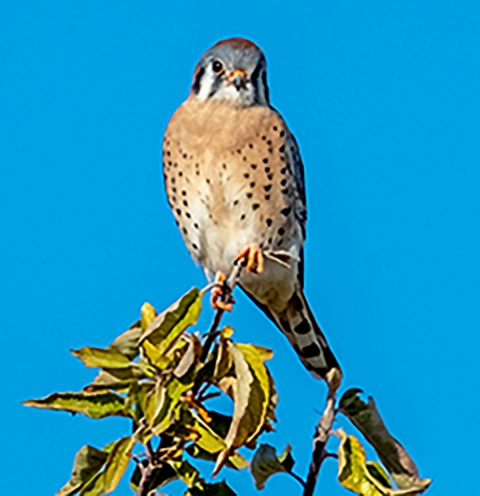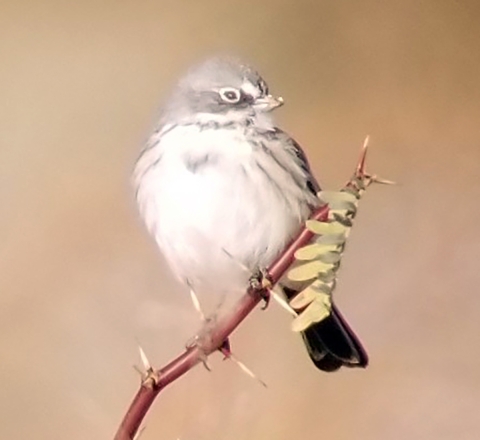Dozens of experienced and novice birders recently teamed with the Red Rock Audubon Society for the 2022 Christmas Bird Counts in southern Nevada. The U.S. Fish and Wildlife Service supports these annual counts, as many tallies are gathered on units of the National Wildlife Refuge System. This was the 61st year for the Corn Creek Christmas Bird Count, the longest running count in southern Nevada, and the 123rd count year across the United States; making the National Audubon Society’s Christmas Bird Count one of the oldest citizen science projects in the world.
Service Biologist Christiana Manville stressed that people do not have to be experienced birders to be involved in the Christmas Bird Count. “It is always great to have first timers out there, Manville said. “Participating in the Christmas Bird Count is a good way to improve one’s birding skills and learn more about nature in general.”
All birds seen or heard within a 15-mile-diameter circle are counted. In southern Nevada, there are six circles, which include areas on the Ash Meadows, Desert, Moapa Valley and Pahranagat National Wildlife Refuges. For the Corn Creek Christmas Bird Count, 22 people braved the chilly air to count birds all day. The Corn Creek Circle encompasses Floyd Lamb Park and Gilcrease Orchard in northwest Las Vegas, and the area around the Corn Creek visitor center on the Desert National Wildlife Refuge. One of the first-timers in the group, Preeti Schatzman of Las Vegas, talked about the experience.
“As a new birder to the area, I am very surprised by the number of bird species we are finding,” Schatzman said. “I think we are lucky here in the desert to see this many birds, especially because of the scarcity of water.”
Manville said participants in the Corn Creek Count recorded 86 species and 3,308 individual birds. “One thing interesting about the count this year is that several higher-elevation species were found at Corn Creek and at Floyd Lamb Park, such as juniper titmouse, Townsend’s solitaire, hermit thrush and Woodhouse’s scrub jay. This may mean they are not finding food at higher elevations or more of these birds flew south to southern Nevada this year to escape inhospitable conditions further north.”
Other highlights at Floyd Lamb Park included a pair of great horned owls hooting at each other at sunset and a male vermillion flycatcher whose bright red colors stood out in the winter landscape. At Corn Creek, the group spotted a red-naped sapsucker/red-breasted sapsucker hybrid and a Wilson’s snipe.
Service biologist Becky Windsor said her first Christmas Bird Count was exciting and full of surprises. “As we dashed across the park to catch up with someone who spotted a new bird, I was inspired by the presence of so many species and by all of my fellow birders. Their excitement throughout the day was contagious. I can't wait for next year's count!”
Prior to the turn of the 20th century, hunters engaged in a holiday tradition known as the Christmas "Side Hunt." They would choose sides and go afield with their guns—whoever brought in the biggest pile of feathered (and furred) quarry won.
Conservation was in its beginning stages in that era, and many observers and scientists were becoming concerned about declining bird populations. Beginning on Christmas Day 1900, ornithologist Frank M. Chapman, an early officer in the then-evolving Audubon Society, proposed a new holiday tradition—a "Christmas Bird Census" that would count birds during the holidays rather than hunt them.
The western United States’ sagebrush country encompasses over 175 million acres of public and private lands. The sagebrush landscape provides many benefits to our rural economies and communities, and it serves as crucial habitat for a diversity of wildlife, including the iconic greater sage-grouse and over 350 other species.
Learn more about sagebrush sparrow while taking part in the 2022 Christmas Bird Count.
The data collected by observers over the past century allow Audubon researchers, conservation biologists, wildlife agencies and other interested individuals to study the long-term health and status of bird populations across North America. When combined with other surveys such as the Breeding Bird Survey, it provides a picture of how the continent's bird populations have changed in time and space over the past hundred years.
To read more about Christmas Bird Counts, visit the National Audubon Society website at https://www.audubon.org/conservation/science/christmas-bird-count






